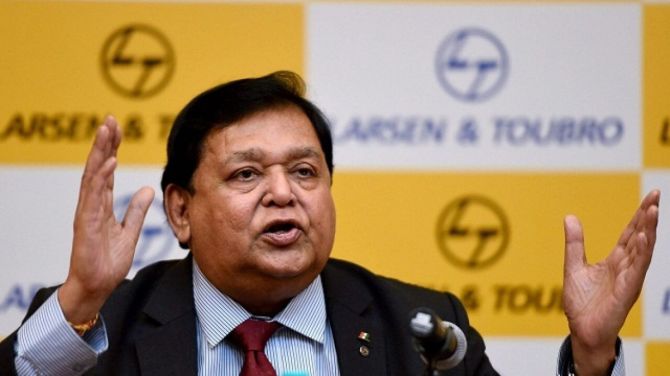'Revival is happening slowly.'
'But that is, if the pandemic is controlled.'

Anil Manibhai Naik, group chairman, Larsen and Toubro and chairman of the National Skill Development Corporation, acknowledges realising Prime Minister Narendra Damodardas Modi's vision of making India the skill capital of the world will not be easy.
But he is undeterred by the challenge.
In a video call, Naik, who will be 79 on June 9, tells Surajeet Das Gupta about his areas of focus in skilling, how to raise more funds for the sector, the poor qualifying requirement for big contracts, and the economy after the pandemic.
What do you think is the key challenge in skill development? Industry has complained there is no dearth of manpower, but people are not skilled enough to be employable.
Have public-private partnerships not taken off?
Large industries do not have to collaborate with the NSDC or government organisations because they have created training centres.
Small and mid-scale industries, which cannot afford that kind of infrastructure, need skilled manpower.
To give you an example, L&T has nine regional centres for just construction skilling.
Training is the backbone of the company and that is why we are ahead of competition.
But for good, skilled manpower, you need good teachers and trainers.
And apart from traditional skills, they need knowledge of digital stuff such as automation.
I don't think even 10 per cent of the trainers have these skills.
The problem is that 90 per cent of the workers are in the unorganised sector and the employers don't know much about digital training and pursuing high quality.
So how do you address the requirement of training?
L&T is making a beginning. We are setting up our first training institute in Maharashtra.
It will train 800-2,000 people. Our plan is to set up more such institutes in Gujarat and Tamil Nadu, creating a capacity to train 3,000 annually.
But that is nothing compared to the requirement. Have you made an assessment of how many trainers and master trainers you require to train?
If you want to train 10 million apprentices a year, for every 10 people you need one trainer.
You need a minimum of 500,000 good trainers, even at a ratio of one trainer to 20 apprentices. It is a mammoth task.
This will require a lot of money. Where will that come from? Skilling needs large funds from the government.
It is the responsibility NSDC has to take and the government has to invest.
I have written to the government, saying that only 10 per cent of the mandatory CSR contribution of 2 per cent of the profits of companies should be earmarked for skill development.
This means just 0.2 per cent of the profits. That is what will be required if we want India to become the skill capital of the world. But you know how everything works.
Has the pandemic led to a reassessment of how we see and deal with labour, especially with the huge migration that happened?
In L&T we have more than 400,000 workers in construction alone.
Of those, 149,000 remained with us. We provide them food, shelter, health care, etc; 250,000 workers went to their states for six to eight months, which is the delay our projects have suffered.
But we have made up for most of the lost time and are more on schedule than our competitors.
The poor qualification requirement in many large projects in India has affected quality. But it has ensured you do not need to hire skilled workers. Is there any learning from it?
The problem is the qualification criteria contractors set.
The criteria should be like those in global contracts.
That is why we don't see many contractors getting a lot of business in West Asia, because to qualify there you need highly skilled workers.
Why is that so?
In India companies get qualified for large projects like those in hydrocarbon even if they have not done a single one in that space.
The same goes for big tunnel projects. That is why about 86 road contracts, worth Rs 2.5 lakh-Rs 3 lakh (Rs 250,000 to Rs 300,000), have been abandoned.
Does the qualification required follow international requirements? You need to investigate.
Are order books and businesses improving in your line of activities?
Revival is happening slowly and we think next financial year will be much better.
But that is, if the pandemic is controlled, especially as cases are suddenly going up in states like Maharashtra.
If this sort of thing keeps happening, the rate of growth will be hampered.
On orders I can tell you they are improving.
Feature Presentation: Aslam Hunani/Rediff.com











